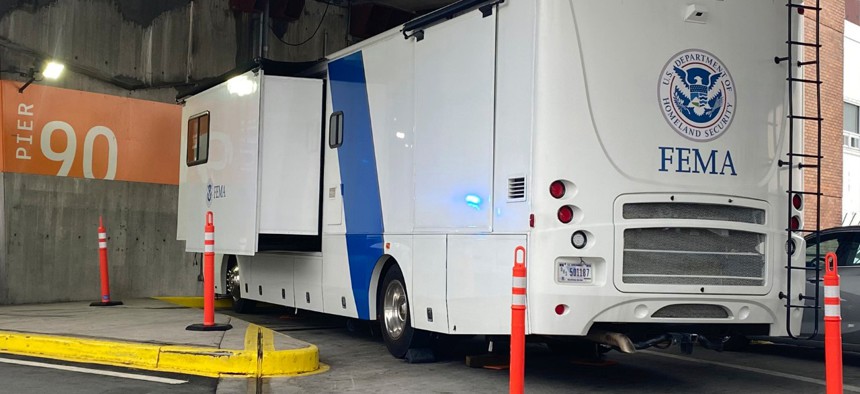
A FEMA truck is parked at Pier 90, temporary home of Navy hospital ship USNS Comfort, to help relieve city hospitals overwhelmed by coronavirus patients in New York City. Rainmaker Photos/MediaPunch /IPX
Former FEMA Chief: Don’t Expect FEMA to ‘Fix’ the Coronavirus Response
Agency faces challenges allocating resources and getting supplies out the door, and could be short-staffed to handle other disasters that arise.
The Federal Emergency Management Agency is taking on vast new responsibilities across the country as it coordinates the federal response to the novel coronavirus pandemic, posing new operational challenges for an already burdened workforce.
FEMA is engaging with the private sector, state and local governments and other federal agencies to allocate resources and address supply shortages. President Trump has already authorized emergency declarations in 22 states, as well as Washington, D.C., Guam and Puerto Rico, to address the outbreak and make federal funding available at the local level. A federal coordinating officer typically assumes responsibility in a state after each declaration, but some are now being tasked with supervising multiple responses.
The emergency response agency is working with state National Guards and the Army Corps of Engineers to construct large alternate care facilities in Detroit, San Francisco, Los Angeles, New York City, Pennsylvania and other locations. It has established a supply chain stabilization task force, working with private industry to preserve existing supplies by reducing unnecessary use and developing ways to recycle them, accelerating industrial manufacturing by facilitating shipments and movement of supplies, expanding production capacity and allocating resources based on highest priority areas.
Trump last week put FEMA in charge of federal response efforts and placed the agency on level one status, its highest designation that activates the agency in every region in the country. The agency, meanwhile, is still dealing with fallout from the record hurricane seasons in 2017 and 2018 and responding to recent emergencies involving earthquakes and tornadoes. FEMA announced disbursements to assist localities in response to hurricanes Irma and Maria, both of which struck in the fall of 2017, as recently as this month.
In a relief for the agency, Brock Long, who served as Trump’s FEMA administrator until last year, anticipated social distancing and the needs of the pandemic response would require thousands fewer employee deployments than he oversaw during major hurricanes. The agency, however, recently received a $45 billion deposit into its Disaster Relief Fund and could encounter problems getting money out the door.
“If there’s one area where FEMA needs more staff support, it would be in the disaster cost recovery arena,” Long said, adding it is processing an “overwhelming amount of money” made available after 2017 and 2018 disasters and, now, the current pandemic.
He stressed, however, the real “nightmare” will be for state and local agencies that have not adequately prepared for this situation. Those offices should have pre-event contracts in place to help surge staffing to allocate federal dollars, provide services such as generators for emergency hospitals and other needs. FEMA, he said, is at the mercy of those agencies, as well as weaknesses in the supply chain. Hospitals have consistently relied on “just-in-time logistics,” leaving them without a stockpile for emergencies.
“Now everyone wants FEMA to fix it,” Long said. “It’s not realistic and it’s not fair.”
He stressed that FEMA employees should not bear the brunt of any outrage due to failures in response efforts.
“They are golden-hearted public servants that get stepped on day in and day out,” Long said. The coronavirus response is “going to be tough, but you're talking about a resilient group of people that are dedicated to the mission.”
He identified two potential areas of concern, the first being the capacity to handle the onslaught of forthcoming reimbursements.
“The disaster cost recovery for this is going to be incredibly difficult,” Long said. If state and local governments do not have proper staffing with expertise to support FEMA, “a lot of mistakes are going to be made and the inspector general will have a field day.”
The second potential problem would be a beleaguered workforce coming out of the coronavirus crisis only to enter wildfire and hurricane season. Congress continues to refill the Disaster Relief Fund’s coffers, but employees will still have to carry out the allocation of resources.
“It is a concern from the standpoint of the endurance of the agency,” Long said. “You can’t sit back and hope hurricane season won’t be active.”
He implored state and local disaster response agencies in coastal regions and other at-risk areas not to neglect mitigation efforts that ensure an easier process after an event. He noted that FEMA is actively trying to boost its own hiring, but ultimately response efforts must be carried out at the state and local level.
“FEMA was never designed to be 9-1-1,” Long said.







